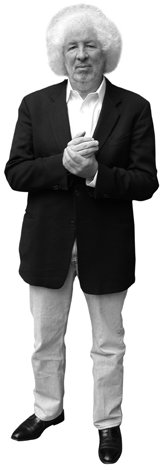In 1975, while speaking on a panel with trade and university publishers at the Library of Congress, poet and editor Daniel Halpern, who four years earlier had founded Ecco Press (now an imprint of HarperCollins), invited his fellow panelists to join him in a project that would commit to publishing five new books of poetry a year. Each would be selected by an established poet and released by a different press, with all publication costs subsidized by a nonprofit entity with funds raised by Halpern. “They all said no,” he recalls. But a few years later, novelist James Michener learned of Halpern’s proposal and helped him found the National Poetry Series, which has since facilitated the publication of books by poets such as Naomi Shihab Nye, Denis Johnson, and Larry Levis. On the thirtieth anniversary of the series’ launch, Halpern speaks about both its history and its future.

What were the founding principles of the series?
You can get a ten-thousand-dollar grant from the NEA, you can get a Guggenheim, but typically that money is just spent—on rent, or putting a new roof on, or whatever—and it’s gone. It doesn’t necessarily further your career. Our notion from the very beginning was that the one thing that will change your career is to get a book of poetry published by a good press—university, small press, or trade—which will enable a poet to get a teaching job, to apply for grants, and will just make them a published poet, which psychologically is so important.
Have the number of submissions to the contest increased over the years?
There are always between thirteen hundred and fifteen hundred submissions every year, no matter what we do, even if we advertise more. The last two years, when people didn’t have any money, the number of submissions did not go down.
How are presses and judges selected?
Publishers step forward. They may say, “We’ll do this for three years,” and that’s fine. The publishers give me a list of three or four judges they’d like. They’ve all been great choices—in some cases, poets I didn’t really know much about.
The series has published debut poets as well as poets further along in their careers. Has the competition been skewed more in one direction than the other?
We’ve never broken it down to first books, second, and so on—but the first year, I was very happy because we had a first book [Silks by Roberta Spear] and also The Collected Poems of Sterling A. Brown, who was a poet who had completely gone by the way. He must have been nearly eighty at that point, and Michael S. Harper picked his book, and Brown was rediscovered.
Have our cultural sensibilities in regard to poetry changed since the series began?
In this country and probably everywhere, poetry is the first thing people turn to during times of crisis or transition—weddings, deaths, 9/11, for instance. It’s always the poem that seems to be capable of carrying the emotional baggage. Whatever that represents, it’s the thing that makes poetry so consistent over the years.
What’s in the future for the National Poetry Series?
I have to be honest; there’ve been times when I just think I can’t raise any more money, especially these last two years. And then the thing that haunts me is: Those five books aren’t going to get published—maybe they will, but I don’t know that. But if someone gave us a million dollars we’d probably put that in a little place, and that would cover all the expenses, and then the series could just go on forever.
Timothy Schaffert is the author of three novels, including Devils in the Sugar Shop (Unbridled Books, 2007). He is the director of the Nebraska Summer Writers Conference and the Downtown Omaha Lit Fest.








